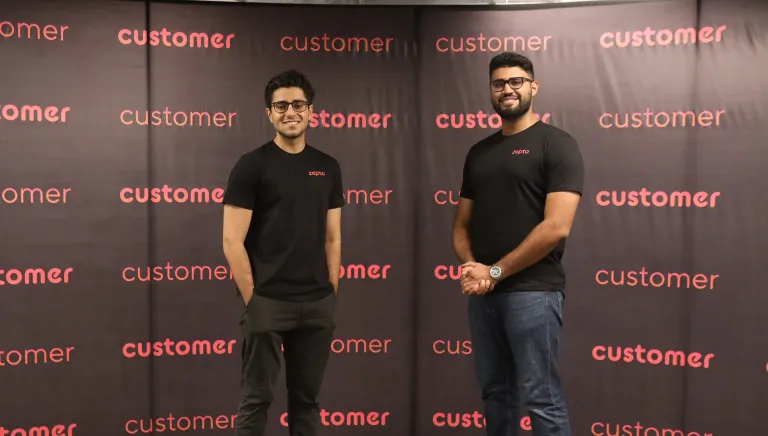In less than a year, Mumbai-based Zepto has raised $665 million, more than doubling its valuation to $3.6 billion from $1.4 billion, with the India startup bent on capturing India’s competitive rapid commerce sector
Zepto provides a rapid delivery service for a wide range of products, including electronic devices and grocery items, to consumers in urban Indian cities.
Despite the fact that the majority of businesses in the rapid-delivery model have failed in developed markets, it is flourishing in India.
The Series F round was “highly oversubscribed” and was co-led by Glade Brook, Nexus, and StepStone Group, according to Zepto.
According to the startup, the round was also supported by existing investors Goodwater, Lachy Groom, and Contrary, as well as Avenir, Lightspeed, and Avra (the new fund of former YC Continuity executive Anu Hariharan).
According to two individuals who are knowledgeable about the matter, DST Global, an early supporter of Swiggy, a Zepto competitor, also co-led the new funding round. Zepto declined to provide a statement regarding DST Global’s involvement in the new funding round.
Zepto is in competition with BlinkIt (owned by Zomato) and Swiggy’s Instamart in the fast commerce sector.
In urban India, these quick commerce companies have established a plethora of discrete facilities, which are referred to as “dark stores.” These facilities can fulfill orders within minutes of purchase by strategically situating them within a few miles of high-demand residential and commercial areas.
Will Robbins, a partner at Contrary, wrote in his thesis that Zepto can establish a more extensive network of stores throughout a city, which enables shorter delivery periods, due to the fact that dark stores require less space to operate than traditional storefronts.
By March 2025, Zepto intends to increase its network of underground stores to more than 700. The startup reported that its annualized gross merchandise value (GMV) is on course to surpass $1 billion, and its revenue has increased by 140% from the previous year. It collaborates with more than 50,000 delivery partners and integrates more than 5,000 new collaborators on a monthly basis.
As of the previous month, approximately 75% of the organization’s dark stores were EBITDA positive. Zepto stated that a dark store that previously required 23 months to achieve profitability now achieves that milestone in six months as a result of enhanced efficiency and scope.
Many investors and analysts have been taken aback by the expansion of rapid commerce firms in India, a $4 trillion economy, particularly in light of the fact that numerous comparable business models have failed in other markets.
“In India, there is a prevailing culture of opting for hyper-local purchases.” This does not actually exist in other regions of the globe.
Aadit Palicha, the co-founder and CEO of Zepto, stated to TechCrunch that customers in India purchase small-ticket items on a hyper-local basis on a weekly basis.

He also mentioned that fast commerce provides them with low-ticket, high-proximity, and hyper-local use cases. “In the offline world, no other grocery format has been able to provide consumers with comparable offerings.”
The scope of quick commerce firms in India is expanding beyond the delivery of groceries. One company guarantees that it will provide its consumers with high-value items, including gaming consoles and smartphones, within ten minutes.
Palicha, who co-founded Zepto with Kaivalya Vohra at the age of 19, stated that the company does provide electronics accessories, such as adapters and cables, but it is not currently in the process of offering high-end electronics on its platform.
“We are not particularly interested in smartphones, high-end fashion, or laptops.” We are more interested in categories that are comparatively low-stakes purchases, such as domestic appliances, undergarments, general merchandise, toys, beauty and cosmetics, and home and kitchen products. Palicha observed that there is resonance.
The startup is presently operational in the most prominent cities in India and has plans to expand to a limited number of smaller cities in the coming months.
Palicha stated that Zepto is buoyed by the initial response from cities such as Jaipur, where the local offline offerings are unable to completely satisfy customer demands.
“I am confident that we will be prepared to go public in the near future if we are able to accomplish this while continuing to satisfy our customers,” he stated in a statement.
Before investing in the current round, Avenir, a venture firm based in New York, had been monitoring Zepto for approximately three years. Ben Jubas, a partner at Avenir, asserted that Zepto is capable of disrupting the conventional trade-offs of retail in India.
“It has the potential to become a significant commerce business as a result of the operational rigor and depth of its value proposition,” he stated in an interview with TechCrunch. “In our opinion, it is unparalleled.”
According to certain industry analysts, the market share of major e-commerce firms such as Flipkart and Amazon will be substantially diminished by quick commerce companies.
Jubas stated that he supports this thesis; however, Zepto’s management is responsible for determining how to exploit it.
The total addressable market in the grocery and non-grocery categories for fast commerce companies in the top 40-50 cities is approximately $150 billion, as per Goldman Sachs..
